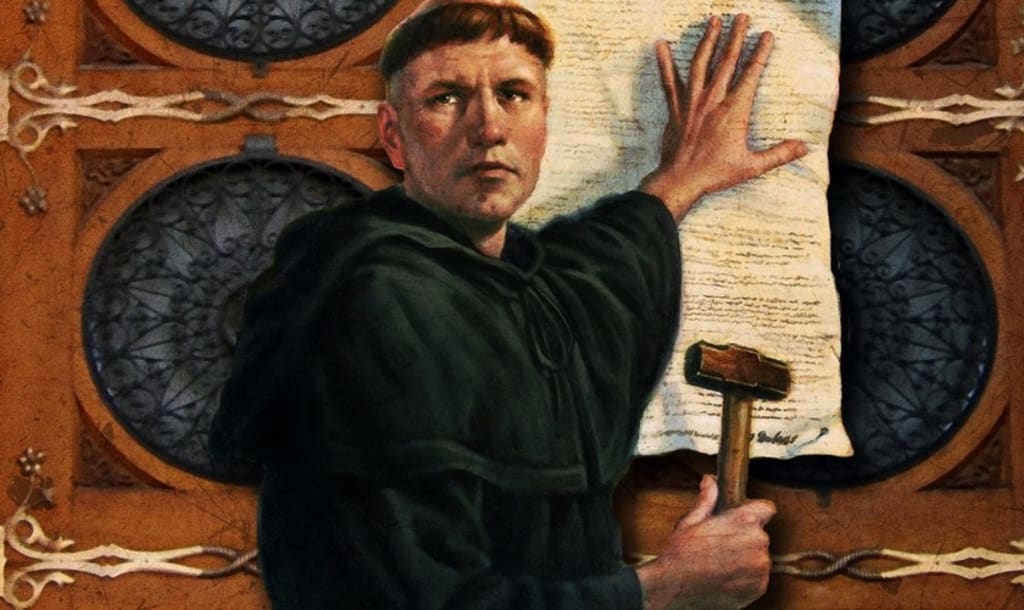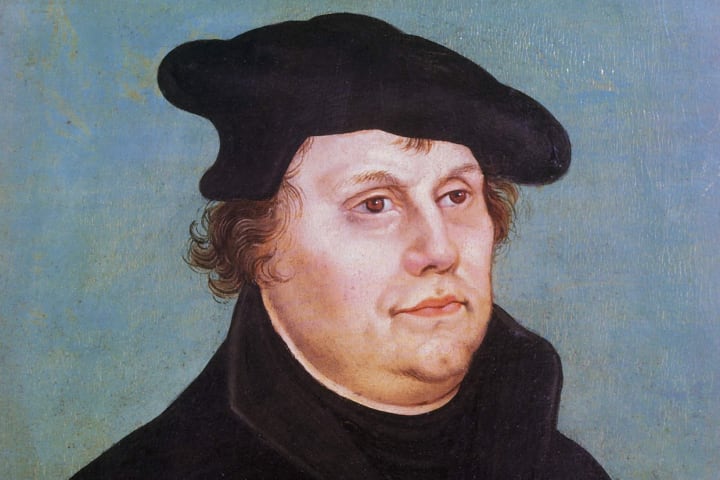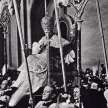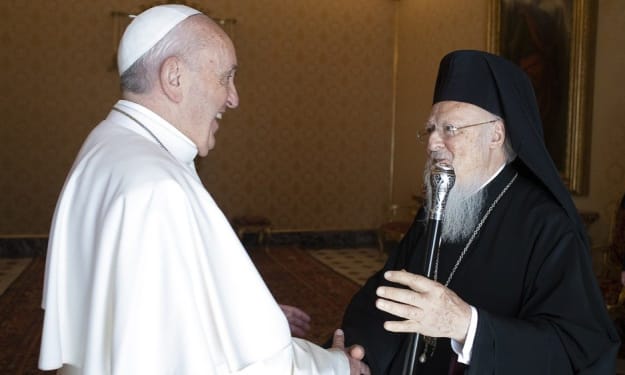About Protestantism
In this article I will deal with the Protestant Reform, especially the historical context in which the reform is born, its main doctrines of its doctrines and finally a brief biography of Martin Luther.

Traditional Protestantism encompasses, mainly, three major wings:
- The Lutheran, from Martin Luther (1483–1546), who came up against the Catholic Church in 1517 in Wittenberg, Germany;
- The Calvinist (who incorporated Zwinglianism), who appears with John Calvin(1509–1564) in Geneva, Switzerland;
- The Anglican, caused by King Henry VIII (1509–1547), in England.
We can mention other considerable wings of traditional Protestantism, such as congregationalism, Methodism, Baptistand Puritans. However, we will only deeply address the three main ones.
Origin of the Protestant word
The word "Protestant" appears in 1526, during the Lutheran Reformation campaign on religious change in Germany. At a meeting of the Reichstag(German imperial parliament) issued a decree on August 27, allowing each individual government within the empire could decide which religion to follow. However, a new meeting of parliament that was convened in 1529 was not so receptive to Lutherans, and the emperor pressed, annulled the decree. In response, supporters of the new church presented a Protest on April 19, in which they complained about the annulment of the decree.
After this event, some cities in southern Germany and some princes, aligned with the thought of another reformer, named Zwingli, signed the Protest in support of Luther's campaign. They were entitled as Protestants, those who protested. The use of the word "Protestant" only came into use in the 18th century, referring to all Christians who disassociated themselves from the Catholic Church.
Historical context in which protestantism emerges
The period from 1309 to 1545, is a troubled time in the history of the Church of Rome, this context will favor the rise of protestantism and enemies within the church. In addition, in this period several popes will prove less dignified and unvirtuous, favoring the increase of corruption and lust within the Vatican.
- From 1309 to 1377, the papacy's place will be in Avignon, France. The Popes in this period will be practically imprisoned in France.
- In 1312 the Order of the Templars was dissolved by Pope Clement. The accusations that fell on the order were heresy and degeneration, but the main reason was political interests of King Philip IV, who put pressure on the Pope to suppress the order of the knights.
- From 1377 to 1417 there was a crisis in the Church, which will be known as the Cyst of the West. After the death of Pope Gregory XI in 1378, three authorities will claim the papacy and will be elected in separate councils. Obviously, only one was the legitimate Pope, whose bearer of the papacy was in Rome. The other two, who were illegitimate, were elected in Avignon and the Italian city of Pisa. The strife will only end with the Council of Constance(1414–1418), which elects Pope Martin V, bringing back the Unity of the Catholic Church.
- During the period of the Great Ism of the West, the heresy of Conciliarism will arise. Basically, the conciliarist doctrine will affirm that an Ecumenical Council is superior to papal power, being able to judge it, condemn it and even deposition it. Although several Popes condemn such heresy, this discussion will be virtually closed at the First Vatican Council.
- In the mid-14th century a cultural movement will emerge in Europe, called the Renaissance, which will last until the beginning of the 17th century. With the ascendancy of these thoughts in Europe, the influence of Catholicism on society will be threatened.
- Already in the fourteenth century, considered the forerunner of Luther and Calvin, John Wycliffe, already gained notoriety for the religious proposals he preached in England. Later, some of his ideas will be introduced into the Protestant movement.
These are just a few facts before the outbreak of protestantism.
The main theses of protestantism
The three main propositions that are common to the various types of Protestantism are: 1) justification by faith without works (Sola Fide); 2) the Bible as the only source of faith, interpreted according to the free examination (Sola Scriptura); 3) the denial of intermediaries between God and the believer (Solus Christus). Let's look at each one in depth:
Justification by faith
This thesis is considered central in Protestant doctrine, especially since from 1516 this thought began to be dominant in Luther's theological thought. During the cloister in the Augustinian convent, friar Martin Luther suffered very psychologically due to various sinful temptations, and to overcome concupiscence, he resorted to ascesis, but failed to succeed. One day, he thought he had found the solution to get rid of desires, opened the Bible in the Epistles of St. Paul and defined that it would be indotituous to fight concupiscence for good works, that is, by penance and selflessness. So it was enough for the individual to accept Jesus Christ as the only Savior, or rather believe that God the Father, in view of the merits of his Son Jesus(his atonement), would not take into account our sins. Thus, by trusting faith, God covers us with the merits of Christ, making us righteous (God reputes righteous ly the one who is guilty), that is, Jesus saves us by "covering" our sins and making us reconcile with the Father.
However, such a statement would not affect the interior of human nature, because even after being "justified by faith", the human being finds himself as ruined by sin, from there Luther speaks of "servant-will" (instead of "free will") of man. As an effect, as long as man keeps his faith trusting, he is sure that he will have his eternal salvation at any stage of his life.
"Be a sinner and sin strongly, but trust and rejoice even more strongly in Christ, the winner of sin, death, and the world. It will sin while we live here." (letter from Luther to Philip Melanchthon, August 1, 1521)
"It is important to emphasize that there are some Protestant currents that consider baptism as the first justification, but in general the means by which justification is achieved is by faith only.
The Bible as the only source of faith and the free examination
Sola Scriptura brought a new concept of source of Christian revelation, rejecting oral tradition and the Magisterium, giving the bible absolute primacy, when one has some doctrinal disagreement, the Bible is always the final word. To help the believer read and understand the Bible, the Holy Ghost would help enlighten the mind and rule the heart. Thus, the believer would have the right to interpret the truths of the Bible according to his own judgment, judging that the Holy Spirit would be instructing him.
Therefore, protestantism gives the believer the right to deny the visible church and its hierarchy, for each individual, assisted by the Holy Spirit, would find again the Word of God lost by the Church.
Denial of intermediaries between God and man
Protestantism decisively values the attitude of each individual towards God; because it is subjective faith that guarantees salvation through the merits of Christ. Therefore, there is little room to contemplate the gifts of God that remain external to man and to him to communicate the merits of the Savior. In other words: it is not plausible to have channels that transmit divine grace, such as the sacraments, rites, and practices that are taught by the visible church and a hierarchy of officially ordained ministers. For Protestants, between man justified by faith and God, there is no priest but the Lord Jesus who is in heaven (the prolongation of the Incarnation through the Church and the sacraments is belittled). In addition, the Holy Spirit is the only Teacher, who speaks in scripture and in the depths of every believer, without using any viable and objective Magisterium. As a result, this will culminate in the various Protestant denominations from the sixteenth century, each independent of each other.
These three central theses of Protestantism are crucial to understanding the repudiation of the sacraments, the ministerial priesthood, sacrifice, indulgences, hierarchy, and the whole system of a church based on divine law.
About Luther, the main mentor of the Protestant Reformation
On October 31, 1517, until then augustinian friar, Martin Luther launched his manifesto against the doctrine and discipline of the Catholic Church, setting out a list of 95 theses written in Latin at the door of wittenberg church in Germany, according to the custom of the academic disputes of the time. His revolting cry quickly reverberated across Europe, generating more and more supporters and leaders in the new church that was emerging. So much so was the effect of the ideas of this movement that today it is stipulated that there are more than 9,000 independent Protestant denominations, according to WEC (World Christian Encyclopedia).

Martin Luther was born in November 1483 in the city of Eisleben, Germany. During his childhood he had a strict discipline at home and at school. In 1501, while studying law at the University of Erfurt, he was greatly influenced by the nominalist philosophy of William of Ockham(1285–1347), with an antimetaphysical and relativistic tendency. Such philosophical thought dissolved the harmony between science and faith, because it regarded the truths of faith as irrational and incompatible with reason, morals would merge only in God's will. Therefore, our acts are based on a divine law, without the aid of reason, but guided solely by will.
On one day, in July 1505, Luther was on his way to university when lightning struck near him, as a result of this fact, prayed to Santa Ana to get out alive from the rays he would become a monk. This attitude was the fruit of scruples and his conception of God as a choleric judge.
Also in July, Luther decided to enter the Augustinian Convent in Erfurt. Even within the monastery there were several failures in the teaching given to him about the Catholic faith, among them the short teaching he received before becoming a priest, in addition to having received nominalist teaching even within the monastery. By 1507 Luther had been ordained a priest, that is, in just under two years he had already become a priest. A year later he was already teaching Sacred Scripture at the University of Wittenberg, but he was tormented thinking about his moral frailty and trying to get rid of his concupiscence.
Luther misunderstood several points of the Doctrine of the Church, on a beautiful day coming into contact with the epistles of St. Paul (especially the Romans and Galatians)offered him the answers to get rid of temptations, from 1517 was silently developing his heretical theses, being the doctrine of faith without the most fundamental works. In 1517, Luther signed his 95 theses at the door of wittenberg church, then had a theological debate with catholic theologian João Maier.
Soon, in 1520, Martin Luther officially disconnected from the Catholic Church, persisting in his doctrines contrary to the Catholic Church. His ideas found resonance among several princes and nobles of southern Germany, who had political resentments towards the Holy See, including Prince Frederick of Saxony. From this, new leaders, supporters and various Protestant currents emerged.
It is important to emphasize that, Martin at first wanted to actually make a "reform" in the ecclesiastical discipline of the Church, since at the time several members of the clergy and episcopate were being seduced by worldly pleasures and engaging in political disputes. However, he was developing and insuffred proposals totally contrary to the dogmas of the Holy Church, until he was excommunicated in 1521 by Pope Leo X.
His last years of sighing the reformer were harrowing, as his ideas were used for various particular and political interests, such as various peasant revolts, enemies and new Protestant strands emerging, which made him put his hopes in a near end. He died on February 18, 1546, in the city of Eisleben, where he was born.
Later, at the Council of Trent(1545–1563)the unity of faith of Catholicism was guaranteed, while seeking to be a response to Protestantism and humanism, reforming ecclesiastical teaching and discipline.
----------------------------------------------------------------------------------------
Link to PDF version:
Please, if you liked share and leave your likes!
Contact email: [email protected]
----------------------------------------------------------------------------------------
Bibliography
https://pt.peopleperproject.com/posts/16200-origin-of-the-word-protestant
https://www.todamateria.com.br/grande-cisma-do-ocidente/
https://cleofas.com.br/a-doutrina-protestante/#:~:text=A%20Doutrina%20Protestante.%20A%20doutrina%20da%20justificação%20mediante,lhe%20era%20próprio%20chamava%20de%20“Evangelho”%20e%20
https://logosapologetica.com/as-95-teses-8-coisas-para-saber-e-compartilhar/
https://www.presbiteros.org.br/sumula-das-doutrinas-protestantes/
http://www.montfort.org.br/bra/cartas/doutrina/20100214200651/
https://igrejamilitante.com/2013/09/02/resumo-das-principais-doutrinas-protestantes-e-sua-refutacao/
http://www.protestantismo.com.br/defesa_fe/denominacoes_protestantes.htm#:~:text=Sendo%20assim%2C%20o%20WEC%20apenas%20classifica%209000%20denomina%C3%A7%C3%B5es,s%C3%A3o%20grupos%20dif%C3%ADceis%20de%20serem%20tachados%20como%20%22protestantes%22.
About the Creator
Victor Nobre
My name is Victor, I am Brazilian, and I am interested in matters related to religion, philosophy and history.
Save Mary!






Comments
There are no comments for this story
Be the first to respond and start the conversation.